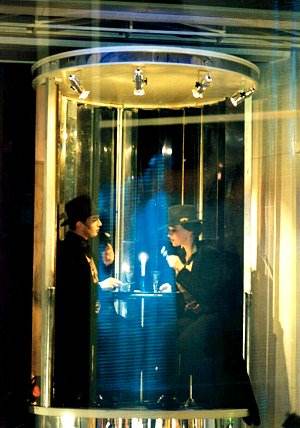S & H International Opera Review
Les Contes d’Hoffmann (performed in French), The Helikon Opera, Moscow, 8th June 2003 (NM)
A nightmarish, sickening fantasy – with luxury casting.
"Not suitable for under-18’s" warns the publicity material – can this really be lovable ol’ Uncle Offenbach of "Can-Can" fame? Dmitry Bertmann’s Helikon production (revived from 1997) mines the macabre and stomach-turning in the Barbier-Carre libretto to create something close to an "Opera Nasty". Nastiest of all of Hoffmann’s four disastrous female encounters is the Antonia scene… the daughter of a famous soprano longs to assume the mantle of her dead mother, but is forbidden to sing due to a fatal lung condition. To prevent Hoffmann getting the girl, the evil Dr Miracle conjures-up a vision of Antonia’s mother, and blackmails her into singing herself to death. An on-stage TV-monitor shows cheesy "top c’s and tiaras" scenes of her famous mother in operetta, inter-cut with a cardiograph that hits flat-line as the helpless girl collapses…. Alissa Gitsba literally sung her heart out in the role.
This was dream casting – nearly every role was covered superbly. Nikolai Dorozhkin stars as the drink-sodden fantasist, and his voice sits ideally for this high-set lyric role. Partnering him as his "science-fiction twin", identically dressed, is Svetlana Rossiyskaya as Niklaus – a stunning vocal performance by any standards. Tatiana Kuinji inevitably brought the house down with the Olympia numbers, a gift to any coloratura soprano, and Ekaterina Oblezova enjoyed similar success as Julietta. Sergei Toptygin seemed to bluster in the four-in-one baritone roles, and couldn’t find the menace behind his words – meanwhile Andrei Vylegzhanin seemed wasted as Luther, and one has to wonder how this casting was reached?It’s a longer evening than the average Hoffmann, being conducted from the Oeser edition, assembled in 1981, and utilising practically all of the material Offenbach produced, edited, inserted, cut – striving to reach the "perfect" version that death put beyond his reach. The role of Niklaus/Muse is enormously increased – he/she has almost more material than Hoffmann himself. Bertmann leaves their relationship ambivalent – is he/she his dream, his imagined love, or some asexual inspiration as the "Muse"? After four acts of highly credible androgyne from Rossiyskaya, there’s a final moment which hints at either homosexuality or transvestism – the jury is out as the curtain falls.
Alexander Volushuk coaxed sweetness and delicate French style from the Helikon Orchestra. Inventive scenery and costumes from resident team Nezhny and Tulubieva cannot conceal how hopelessly inadequate this theatre building is. The orchestra occupy what ought to be the front stalls; the stage is 3 metres deep; scenery remains fixed in place since it is built on the spot; there are no curtains and no flies. Bertmann’s company are victims of their own outstanding abilities. By proving that it’s possible to achieve world-class standards in abysmal conditions, they seem fated to be forced to continue doing so; whilst frankly incompetent ensembles enjoy purpose-built facilities in which to perform to their aunties and empty seats.
Neil McGowan

 Return to:
Return to: